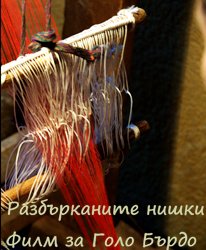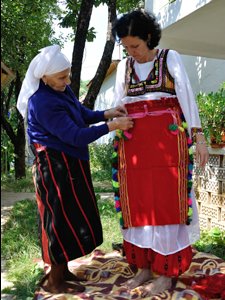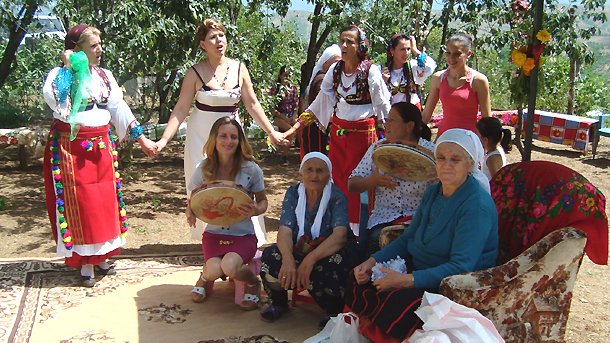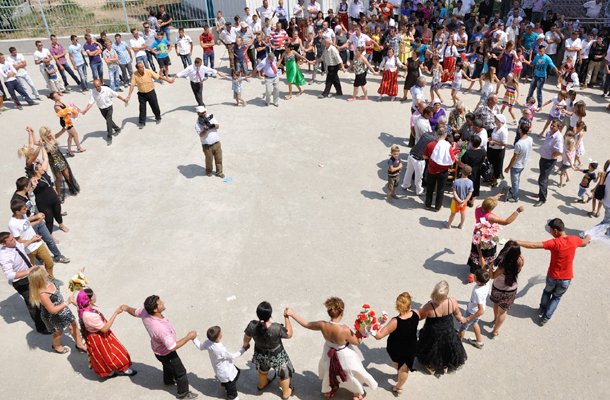
December 12th, the premiere of an exciting documentary film took place in Sofia – “The Mixed Threads. A Film about Golo Burdo”. Its writer is Dr. Vesselka Toncheva from the Institute of Ethnology and Folklore Studies with Ethnographic Museum at BAS. For years, she has been studying the Bulgarian communities living in the high mountainous area of Golo Bardo, located on the eastern border of Albania and western Macedonia. In the Albanian territory of this area there are 21 villages, some of them with mixed population - Christians and Muslims. The producer of the movie is Kaya Vision Film Production House. The 45-minute reel has been financed by the Scientific Research Fund. It depicts interesting old traditions that are still alive today.
"Mixed Threads" is a metaphorical title as the life of these people resembles the ball of entangled threads, says Dr. Vesselka Toncheva. “After the Balkan Wars of 1912-1913,

the Golo Bardo area was included mainly in the territory of the newly-established Albanian state. Later, local people experienced the totalitarian regime of Enver Hoxha. And when in the 1990s the borders opened, these people could between Bulgaria, Macedonia and Albania. The theme of identity is fragile and cannot be unequivocal. There are people who identify as residents of Golo Bardo, i.e. the major criterion is the place mainly because this is the land they inherited from their ancestors. They compare themselves with Bessarabian Bulgarians who also live outside their homeland. But unlike them, during the rule of the Ottoman Empire, they did not leave the Bulgarian territories but remained in the area. In Macedonia, they are seen as Macedonians, and in Albania - as part of the Slavic-speaking population. Some elderly people say their ancestors were Bulgarians. Some of the younger people choose a Macedonian and even an Albanian identity. And their self-identification as Golo Bardo residents has a certain protective nature. To this day, children learn the official Albanian language at six years of age when they start attending school. At home they speak their mother tongue. Ultimately, this is like a ball of interwoven threads. The image of the threads is also pervasive in the film with the physical image of the weaving loom that appears in several scenes and gives pace to the unfolding of the

story. The local people in Golo Burdo keep weaving their traditional costumes and putting them on at holidays is a matter of honor. This is not an outward posture but an inner desire and need. The film portrays a woman who weaves costumes, preserving their traditional appearance. She tells how in August, the month of weddings, there are many orders. Thus was how the idea for the title of the film was born. When we went to her, she had just prepared the weaving loom."
The film also shows a typical wedding for this place. The images capture not only the day of the marriage, but the other ritual days that last through the entire week.
In the summer, the young men return from abroad where they went to look for work and earn a living and come home to take a local girl and throw a wedding in the village according to the local custom. As Associate Professor Toncheva says, for them it is very important to make a wedding like this. And though new trends are slowly making their way, such as the white wedding dress, the community is generally a guardian of old traditions. The film was shot in six villages – Golemo Ostreni, Malo Ostreni, Trebishta, Vormitsa, Ginevets, and Orzhanovo.

© Photo: personal archive
“What we have shown in the different villages is related to the people we talked to, Vesselka Toncheva says. The wedding was shot in the village of Golemo Ostreni. In one village we shot a mosque and in another – a church. One of the themes in the film is related to both Muslims and Christians and their good relationship. And before 1967, when Enver Hoxha banned religion, they have always coexisted peacefully. After the democratic changes they assist each other in the restoration of religious temples. Another theme in the film are the songs of Golo Bardo. These are mainly divided into two layers - the ritual ceremonial songs that women perform to this day, and male songs. These are newer and more popular, learned from other places where the men have traveled. The local men used to go to work at far-away place. They are known as very good builders and even during the time of the Ottoman Empire they traveled freely to its outermost edges to build."
The years of the totalitarian regime of Enver Hoxha are also present in the film with archival footage provided by the Serbian Radio and Television.
“The film begins and ends with Fouad Dolya with whom we were staying and who, figuratively speaking, plays the role of the local sage"film director Ekaterina Minkova told RB. "I love to be filming in villages because people there are so natural and there is no pretence. The people who performed the songs and dances had an innate artistic talent. We encountered little difficulty communicating.”

The aim of the film is to familiarize Bulgarian viewers with the region of Golo Bardo. According to Prof. Toncheva, Albania is a country that is now developing very rapidly, and Bulgaria’s relationship with it could be precisely found in Golo Bardo.
English Rossitsa Petcova
European Days of Artistic Crafts are starting today in Bulgaria's Antonovo . The motto of this year's edition is "The Golden Thread", which is why it will begin with workshops on wool felting. Every day until the end of the week, residents and..
Writer Kalin Terziyski will present his collection of short stories "Is Anyone There to Love You?" at the Bulgarian Cultural Institute in Berlin on April 1. The book, translated into German by Elvira Bormann, tells of life in a city full of mystery,..
On Theater Day - March 27, the Union of Artists in Bulgaria traditionally presented the National Awards for Performing Arts IKAR. The award for outstanding contribution to Bulgarian theatre went to actor Yavor Milushev and was..
Writer Kalin Terziyski will present his collection of short stories "Is Anyone There to Love You?" at the Bulgarian Cultural Institute in Berlin on April..
European Days of Artistic Crafts are starting today in Bulgaria's Antonovo . The motto of this year's edition is "The Golden Thread", which is why it will..

+359 2 9336 661
